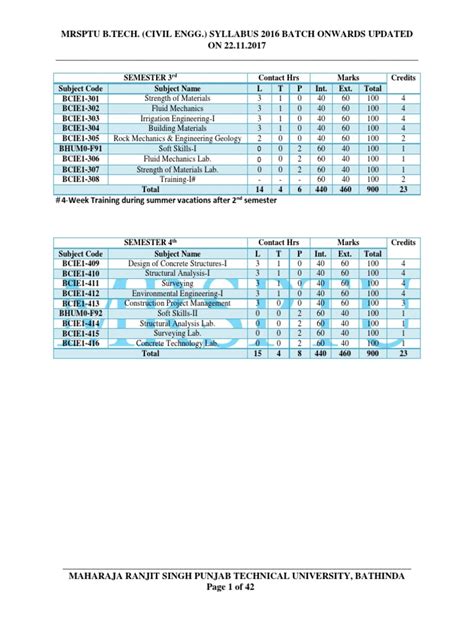

B. Tech Civil Engineering Syllabus PDF: An Ultimate Guide to 8 Semesters of Knowledge
Introduction
Are you aspiring to become a skilled civil engineer? If so, you’ll need to master the comprehensive syllabus that forms the foundation of your B. Tech program. This article presents you with a detailed PDF of the B. Tech Civil Engineering syllabus, providing an in-depth overview of the 8 semesters that will shape your academic journey.

Semester-Wise Syllabus Breakdown
The B. Tech Civil Engineering syllabus is typically structured into 8 semesters, each focusing on specific areas of civil engineering knowledge and skills. Here’s a breakdown of each semester’s content:
Semester 1:
* Engineering Mathematics
* Engineering Physics
* Engineering Chemistry
* Engineering Mechanics
* Basic Civil and Environmental Engineering
Semester 2:
* Engineering Graphics
* Building Materials and Construction
* Surveying-I
* Structural Analysis-I
* Fluid Mechanics
Semester 3:
* Geotechnical Engineering-I
* Transportation Engineering-I
* Structural Analysis-II
* Construction Technology
* Environmental Engineering-I
Semester 4:
* Geotechnical Engineering-II
* Transportation Engineering-II
* Structural Design-I
* Estimation and Costing
* Environmental Engineering-II
Semester 5:
* Design of Concrete Structures-I
* Design of Steel Structures-I
* Water Resources Engineering-I
* Irrigation and Drainage Engineering
* Engineering Geology
Semester 6:
* Design of Concrete Structures-II
* Design of Steel Structures-II
* Water Resources Engineering-II
* Environmental Impact Assessment
* Remote Sensing and GIS
Semester 7:
* Highway Engineering
* Railway Engineering
* Airport Engineering
* Construction Management
* Elective-I
Semester 8:
* Dissertation / Project Work
* Elective-II
* Elective-III
Key Concepts Covered
Throughout the 8 semesters, the B. Tech Civil Engineering syllabus covers a wide range of key concepts essential for civil engineers, including:
- Structural Engineering: Analysis, design, and construction of structures
- Geotechnical Engineering: Properties and behavior of soil and rock
- Transportation Engineering: Planning, design, and construction of transportation systems
- Water Resources Engineering: Management, conservation, and distribution of water resources
- Environmental Engineering: Protection and preservation of the environment
- Construction Management: Planning, execution, and control of construction projects
Importance of a Comprehensive Syllabus
Understanding the syllabus is crucial for success in your B. Tech Civil Engineering program. It provides:
- Course Outlines: A detailed breakdown of each course’s objectives, content, and evaluation methods
- Time Management: A clear timeline for completing assignments, projects, and exams
- Focus and Direction: Guidance on the areas of civil engineering you’ll explore
- Career Preparation: Insights into the skills and knowledge required for various civil engineering roles
Tips for Success
To excel in your B. Tech Civil Engineering program, consider these tips:
- Study Regularly: Dedicate sufficient time to each course, focusing on both theoretical concepts and practical applications.
- Attend Lectures and Tutorials: Engage actively in classes to clarify doubts and expand your understanding.
- Practice Problem-Solving: Solve numerous problems and assignments to reinforce your knowledge and develop critical thinking skills.
- Seek Help When Needed: Don’t hesitate to ask for assistance from professors, classmates, or teaching assistants.
- Utilize Study Resources: Take advantage of textbooks, lecture notes, videos, and online resources to supplement your learning.
Common Mistakes to Avoid
To prevent setbacks in your academic journey, avoid these common mistakes:
- Ignoring the Syllabus: Familiarize yourself thoroughly with the syllabus to avoid surprises and manage your workload effectively.
- Procrastinating Assignments: Start working on assignments early to avoid stress and ensure quality submissions.
- Neglecting Problem-Solving: Practice problem-solving consistently to enhance your analytical abilities and exam preparation.
- Missing Classes: Regular attendance is essential for understanding the course material and securing good grades.
- Underestimating the Coursework: Civil Engineering requires dedicated effort and a balanced approach to handle the demanding syllabus.
Conclusion
The B. Tech Civil Engineering syllabus is an extensive roadmap that guides you through the fundamental principles and advanced applications of civil engineering. By understanding the syllabus, following tips for success, and avoiding common pitfalls, you can pave the way for a successful and rewarding career in this dynamic field. Download our comprehensive PDF of the B. Tech Civil Engineering syllabus today and embark on your academic journey with confidence!
Additional Information
Table 1: Course Distribution by Semester
| Semester | Number of Courses |
|---|---|
| 1 | 7 |
| 2 | 7 |
| 3 | 7 |
| 4 | 7 |
| 5 | 6 |
| 6 | 7 |
| 7 | 6 |
| 8 | 3 |
Table 2: Key Concepts and Corresponding Courses
| Key Concept | Courses |
|---|---|
| Structural Engineering | Structural Analysis-I, Structural Analysis-II, Design of Concrete Structures-I, Design of Concrete Structures-II, Design of Steel Structures-I, Design of Steel Structures-II |
| Geotechnical Engineering | Geotechnical Engineering-I, Geotechnical Engineering-II |
| Transportation Engineering | Transportation Engineering-I, Transportation Engineering-II, Highway Engineering, Railway Engineering, Airport Engineering |
| Water Resources Engineering | Water Resources Engineering-I, Water Resources Engineering-II |
| Environmental Engineering | Environmental Engineering-I, Environmental Engineering-II, Environmental Impact Assessment |
| Construction Management | Construction Technology, Estimation and Costing |
Table 3: Industry Statistics
- According to the American Society of Civil Engineers (ASCE), the civil engineering industry is expected to grow 20% by 2026.
- The Bureau of Labor Statistics (BLS) reports that the median salary for civil engineers in the United States is $87,060 per year.
Table 4: Potential Career Paths
- Structural Engineer
- Geotechnical Engineer
- Transportation Engineer
- Water Resources Engineer
- Environmental Engineer
- Construction Manager










